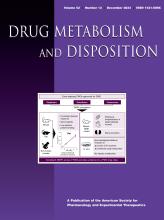Abstract
Landmark studies describing the effect of microbial infection on the expression and activity of hepatic cytochrome P450 3A (CYP3A) used bacterial lipopolysaccharide (LPS) as a model antigen. Our efforts to determine if these findings were translatable to viral infections led us to observations suggesting that engagement of integrin receptors is key in the initiation of processes responsible for changes in hepatic CYP3A4 during infection and inflammation. Studies outlined in this manuscript were designed to evaluate if engagement of integrins, receptors commonly utilized by a variety of microbes to enter cellular targets, is vital in the regulation of CYP3A in the presence and the absence of virus infection. Mice infected with a recombinant adenovirus (AdlacZ) experienced a 70% reduction in CYP3A catalytic activity while those infected with a mutant virus with integrin-binding RGD sequences deleted from the penton base protein of the virus capsid (AdΔRGD) did not experience altered CYP3A activity. Both CYP3A gene expression and protein expression in AdlacZ-treated animals was suppressed while it remained at approximately the same level as uninfected controls in mice receiving AdΔRGD. Silencing of the integrin β-subunit reverted adenovirus-mediated CYP3A4 suppression in vitro but silencing of the β-subunit did not. Suppression of integrin subunits had a profound effect on nuclear receptors PXR and CAR while RXRα was unaffected. This is the first time an extracellular receptor has been indicated in the regulation of CYP3A. This has several implications due to the important role of integrins in infectious and non-infectious disease states.
- The American Society for Pharmacology and Experimental Therapeutics






